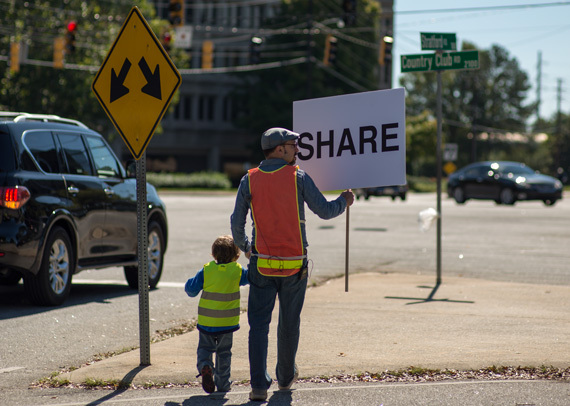
Joel Tauber, "SHARE" (photo direction: Joel Tauber, shot by Kristi Chan) from the art installation and movie, "The Sharing Project"
It's hard for me to share my video equipment or to let anyone into my studio. I tell myself that I would face all kinds of problems if anyone damaged my gear, and that I need peace and solitude in order to work effectively. Yet, my rationalizations leave me feeling guilty. I sense that I'm not acting generously enough, and I worry about what my behavior is teaching my kids.
One day, my son Zeke, crying profusely, banged on my door, and demanded to know why I wouldn't share my space with him. I didn't have a good answer. Then, Zeke showed me his secret hiding spots and offered to share them with me. He argued that there was plenty of room in his "office" for my tools and that I didn't need another space for them.
Zeke's generosity overwhelmed me, but I wasn't able to accept his offer. Safeguarding my personal possessions in my own space was too important to me.
As I tried to justify my feelings, I thought about John Locke's claim that we should have the freedom to acquire our own land and wealth and that it shouldn't bother anyone -- unless we do so excessively, or during times of scarcity.
Unfortunately, we seem to have forgotten about Locke's restrictions, and we've created a tremendous amount of inequity in the process. While a few of us enjoy excessive amounts of wealth, far too many of us struggle with scarcely enough -- if anything -- to eat.
Gene Nichol; who runs the Center on Poverty, Work, and Opportunity at the University of North Carolina; tells me that 18 percent of North Carolinians live in poverty and that there are higher levels of poverty in the United States than in any of the other wealthy Western Democracies.
As I eat dinner with my wife and our two young boys in our home in Winston-Salem, I think about how there might be more childhood hunger in our city than anywhere else in our country. How can we allow that horrific reality to occur in such a wealthy place?
I was wrestling with that dilemma when I went to the Moral March in Raleigh last February. It was a big protest, maybe the biggest in the South since 1965 and perhaps the biggest in North Carolina history. I saw buses from Tennessee, Virginia, and elsewhere. There was a giant traffic jam, as buses filled with activists tried to park. Everyone on our bus was feeling antsy. They knew that there was a lot at stake, and they wanted to be a part of it.
I had taken Zeke to smaller protests in Winston-Salem, and I wanted him to experience the March in Raleigh and hear why people were protesting; but it just seemed too dangerous. Too many people had been arrested -- including some people I knew -- in previous Moral Monday events, and I couldn't justify putting our young son in danger.
The crowd was large, and it was loud. Zeke would have been impressed, and he would have enjoyed seeing all of the signs. They were inventive, and they expressed people's thoughts about a plethora of things, from the torture we've done in Guantanamo Bay to the wars we've waged overseas; but mostly the signs and chants reflected what's happening in North Carolina right now.
North Carolina has a high unemployment rate. People need help, but we've decided to eliminate significant social safety nets that are essential for those who can't find jobs. We've decided to cut unemployment benefits and reduce the number of weeks of eligibility. We've declined expanded federal funds for unemployment benefits and for Medicaid.
Is this what sharing looks like these days? Is this what we want to teach our kids?
Reverend Barber insists that the laws that we have passed are immoral. He talks about how we cannot be silent and how we must insist on change.
We were all hoping for change at the Moral March, but it hasn't occurred yet. So, we will gather in Raleigh to march again.
Joel Tauber is an artist and filmmaker who is developing the video art program at Wake Forest University. His current undertaking - "The Sharing Project" - will be presented as both a sculptural video installation and a feature film. http://thesharingproject.net